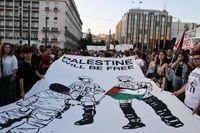Introduction
The debate surrounding the delay of addressing key Palestinian issues has long been a complex part of regional and international politics. Many stakeholders, from local leaders to global powers, have often played roles that result in the deferral of meaningful dialogue and progress. This article explores the roots of this postponement and its broader implications.
Historical Context and Political Dynamics
Over the years, numerous political maneuvers have contributed to the issue being continually put on hold. Historical accounts show that various strategies were employed to sideline the urgency of Palestinian matters, sometimes prioritizing other regional concerns. The interplay between diplomatic interests and domestic politics has often led to a cycle where the Palestinian issue is repeatedly delayed, despite its longstanding significance.
Strategic Postponement and Its Implications
The deliberate decision to postpone addressing the Palestinian question can be seen as a strategy to maintain stability, avoid confrontation, or even manage broader geopolitical ambitions. However, this approach has not been without consequence. Critics argue that continuous delays only serve to deepen mistrust and frustration among those who view timely resolution as essential to lasting peace. In contrast, proponents of postponement sometimes claim that it allows for careful negotiation and incremental progress in a highly volatile environment.
International Perspectives
The global community remains divided on how best to tackle this challenge. Some international actors push for immediate measures that recognize Palestinian rights and aspirations, while others advocate for a cautious, measured approach. This tug-of-war reflects the broader complexities of regional diplomacy and the often competing interests of nations that have a stake in the ongoing conflict. The hesitancy to engage fully has led to a persistent stalemate that complicates the prospects for a peaceful resolution.
Future Outlook
Looking ahead, there is cautious optimism that renewed dialogue could pave the way for constructive change. Many believe that by addressing the core issues head-on, stakeholders can work towards a more equitable and lasting solution. However, significant obstacles remain, including political inertia and deeply ingrained strategies of delay. The future will likely depend on the willingness of all parties to move beyond postponement and commit to meaningful, forward-looking negotiations.
Conclusion
Ultimately, the practice of deferring the Palestinian issue has only reinforced divisions and stalled progress. A shift towards timely engagement and comprehensive dialogue is essential for achieving a sustainable peace. As the dynamics of the region continue to evolve, the need for a balanced, proactive approach to the challenges at hand grows ever more pressing.

Embracing Faith, One Insight at a Time!
The teachings of the Quran have always guided my path. With a deep passion for Islamic knowledge, I strive to blend the wisdom of tradition with the relevance of today, making the timeless messages of Islam accessible and meaningful for everyone.
Muslim Culture Hub is my platform to share historical insights and thought-provoking articles, exploring both well-known and lesser-discussed aspects of Islamic culture and beliefs. My mission is to create an inclusive online space where everyone can learn, strengthen their faith, and connect with the profound message of Islam.
Join the journey!
May peace be upon you.








